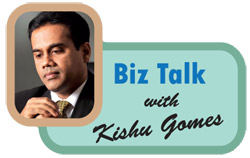 Speed wins in sports and business Speed wins in sports and business
In sports and business, speed matters a lot. Whether its a machine or
human activity, speed sometimes differentiates between winning and
losing.
In essence, it could be a real competitive advantage when all other
variable factors seem equal. To be fast means to see trends and big
opportunities before they become obvious to everyone, make decisions on
the spot and without delay, execute quickly at every level and to
anticipate the need for change before the marketplace passes on a
judgment that you just don't 'get it' as a business.
Speed has its popular connotation but speed in business isn't about
being frazzled and out of breath. What frazzles us and wears us out are
all the speed bumps that get in our path while on a business errand.
If your execution speed is lower than that of your known and unknown
competitors, then you are in for a surprising defeat.
Bad as it can be, the loss of sizable revenue opportunities may not
be experienced until you have invested big time money and sweat into the
game.
If you are at the early stage, always bear in mind that businesses
are built not to be the innovative first fast mover, but to fill a void
in the market place.
Speed
One should know that life's best opportunities are measured in time.
And that time is not enough to accomplish all that you desire. Making
the right choice is crucial for success.
In the fast paced world we live in today, speed is the ultimate
customer turn on. Customers are willing to pay for speed. The old saying
'time is money' is more true in the new world. Everyone is short of
time. Customers hate delays, long queues, and the excuse of
out-of-stock.
Customers love finding what they want, making the purchase and
getting back to work fast. Speed is the one advantage that big
competition can't duplicate easily. Most big companies are bureaucratic,
functionalised, and self-absorbed with long approval processes and due
diligence.
They don't listen, they are slow to change and they kill momentum and
initiative. The one barrier to entry that still stands is 'execution'.
Everybody can get the same idea and lots of people can raise money but
when it comes to implementing and executing lots of competitors are all
thumbs. Ideas without speedy execution are worth nothing.
If you think your idea is worth anything to anyone other than
yourself: Try selling it.
Reflexes
A company can see an opportunity to innovate or capture new customers
and market share, but by the time resources are allocated and people
with the right skills are put in place, the opportunity is gone.
The organisation simply cannot get out of its own way. The pace of
change takes its toll on an organisation. One way to think about
organisational agility is much like the way the head of a supply chain
organisation thinks about quality.
Quality isn't a matter of appointing someone to check your products,
because by then it's too late. Rather, it's a matter of embedding
scrutiny and commitment into every step of the process. An agile
organisation looks across multiple dimensions of talent, culture,
organisation structure and leadership, and embeds flexibility to ensure
speed.
It adds up to a workforce that can move closer to the speed of ideas
and opportunities.
The exemplars also put a premium on rich collaboration - which
shouldn't be confused with slow consensus-building.
Truly effective collaboration involves the wide distribution and free
flow of information, quick sharing of perspectives from across the
organisation and rapid decision-making that can, when needed, jump
hierarchies in a single bound. |

